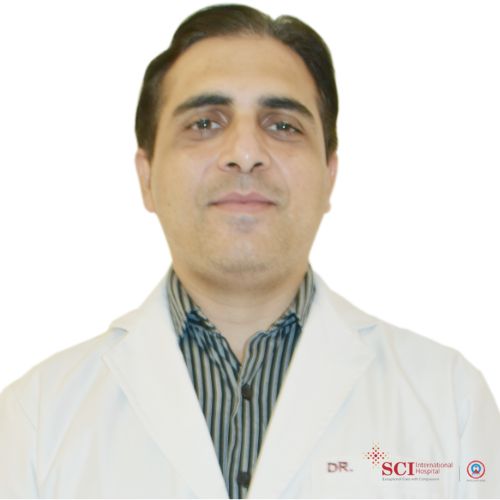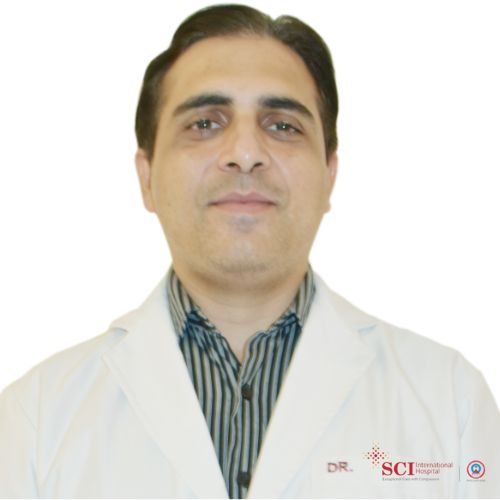What is a Deviated Nasal Septum?
The nasal septum is a thin wall of bone and cartilage that divides the nose into two sides. Ideally, this wall should be in the center, giving equal space to both nasal passages. In people with a deviated septum, the wall is bent to one side, making one nasal passage smaller than the other.
A minor deviation might not cause problems, but a severe one can block airflow, affect breathing, or lead to repeated sinus issues.
What Causes a Deviated Septum?
A deviated septum can be present at birth or develop later in life. Common causes include:
- Congenital condition: Some people are born with a deviated septum.
- Injury or trauma: A blow to the nose from sports, a fall, or an accident can move the septum out of place.
- Nasal growth during puberty: As the nose grows, the septum may shift or become uneven.
Common Symptoms of a Deviated Nasal Septum
Not everyone with a deviated septum has symptoms. But when they do appear, they can include:
- Difficulty breathing through one or both nostrils
- Frequent nasal congestion (especially on one side)
- Repeated sinus infections
- Nosebleeds
- Noisy breathing or snoring during sleep
- Headaches or facial pain
- Dry mouth due to mouth breathing
- Decreased sense of smell
If you notice these symptoms often, it’s a good idea to see an ENT specialist.
How is a Deviated Septum Diagnosed?
Diagnosing a deviated septum usually starts with a physical exam. The doctor will look inside your nose using a light or a nasal speculum. They may ask about your symptoms and medical history. Sometimes, additional tests may be used:
- Nasal endoscopy: A thin, flexible tube with a camera is used to see inside the nose.
- CT scan: Gives a detailed image of your nasal structure and helps rule out other problems.
These tools help doctors see the shape of the septum and how much it is blocking the airway.
When Should You See a Doctor?
You should consider seeing a doctor at SCI Hospitals if:
- You have trouble breathing through your nose, especially at night
- You often get sinus infections or headaches
- You have frequent nosebleeds
- You snore or have sleep problems
- Your symptoms affect your daily life
Getting checked by an ENT specialist can help you find relief and avoid long-term problems.
Can a Deviated Septum Cause Other Health Problems?
Yes, a badly deviated septum can lead to other health issues, including:
- Chronic sinusitis: Blocked nasal passages can trap mucus, leading to infection.
- Poor sleep quality: Difficulty breathing can cause sleep apnea or loud snoring.
- Mouth breathing: This can dry out your mouth and increase the risk of dental problems.
- Frequent headaches: Blocked sinuses may lead to facial pressure or pain.
Correcting the septum can improve these conditions and overall quality of life.
Treatment Options for Deviated Nasal Septum
The treatment for a deviated septum depends on how severe it is and how much it affects your life. Some people only need medicine to manage symptoms, while others may need surgery.
Medications and Non-Surgical Relief
Mild cases can often be managed with medications such as:
- Decongestant sprays or tablets: Reduce swelling and improve airflow.
- Antihistamines: Help control allergy symptoms.
- Nasal steroid sprays: Reduce inflammation in the nasal passages.
These do not fix the septum but can provide temporary relief.
Septoplasty – Surgery to Correct Deviated Septum
If your symptoms are serious or long-term, your doctor may recommend septoplasty. This is a surgery to straighten the septum and open the nasal passages.
- It is usually done under local or general anesthesia.
- The surgeon works through the nostrils, so there are no visible cuts.
- The bent parts of the septum are reshaped or removed.

Dr. Manish Gupta
MBBS, MS - ENT, ENT/ Otorhinolaryngologist
Cost of Deviated Septum Treatment in Delhi
Cost of Deviated Septum Treatment in Delhi
- The severity of your condition
- The type of tests needed
- Whether surgery is required
- Room type and hospital stay (if applicable)
- Insurance coverage
At SCI Hospitals, we offer affordable treatment plans, transparent billing, and assistance with insurance claims to make your care stress-free.
Why Choose SCI Hospitals for Deviated Septum Treatment?
SCI Hospitals is one of the leading centers for ENT care in Delhi. Here's why patients trust us:
- Skilled ENT surgeons with years of experience
- Latest tools like nasal endoscopy and imaging
- Safe and minimally invasive surgical techniques
- Comfortable and hygienic hospital environment
- Personalized care before and after treatment
We focus on treating the root of the problem and ensuring long-term results.
FAQs
A deviated septum, a crooked wall inside your nose, can sometimes cause breathing problems. If it's bothering you, there are ways to fix it. SCI Hospital offers both non-surgical and surgical options. Non-surgical treatments like nasal sprays and decongestants can help manage symptoms. But they don't fix the underlying problem. For a permanent solution, septoplasty is the way to go. It's a surgery that straightens the septum, improving airflow. SCI Hospital surgeons are experts in septoplasty. They use minimally invasive techniques for faster recovery.
Many people have a slightly deviated septum without even realising it. If it doesn't bother you, it's usually okay to leave it alone. But if it affects your breathing or causes other problems like nosebleeds or sinus infections, it's worth getting it checked out. At SCI Hospital, we can evaluate your septum and determine if treatment is necessary.
If your deviated septum is causing significant problems, fixing it can make a huge difference. Improved breathing, fewer sinus infections, and better sleep are just some of the benefits. SCI Hospital provides top-notch care for deviated septums. We'll guide you through the process and answer all your questions. Is it worth it? If you're tired of breathing difficulties and related issues, it definitely can be.
Consult Now
Our Patients Love Us
Excellent



